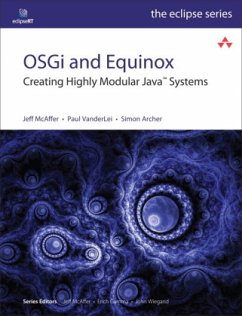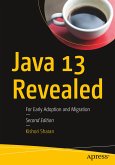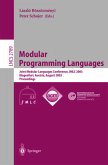Product Description
<>A Hands-On Guide to Equinox and the OSGi Framework
In OSGI and Equinox: Creating Highly Modular JavaT Systems, three leading experts show developers-for the first time-exactly how to make the most of these breakthrough technologies for building highly modular dynamic systems.
You'll quickly get started with Eclipse bundle tooling, create your first OSGi-based system, and move rapidly to sophisticated production development. Next, you'll master best practices and techniques for creating systems with exceptional modularity and maintainability. You'll learn all about OSGi's Declarative Services and how to use them to solve a wide variety of real-world problems. Finally, you'll see everything that you've learned implemented in a complete case study project that takes you from early prototype through application delivery.
For every Eclipse developer, regardless of previous experience, this book
Combines a complete hands-on tutorial, online sample code at every step, and deep technical dives for working developers
Covers the OSGi programming model, component development, OSGi services, Eclipse bundle tooling, server-side Equinox, and much more
Offers knowledge, guidance, and best practices for overcoming the complexities of building modular systems
Addresses practical issues ranging from integrating third-party code libraries to server-side programming
Includes a comprehensive case study that goes beyond prototyping to deliver a fully refined
and refactored production system
Whatever your application, industry, or problem domain, if you want to build state-of-the-art software systems with OSGi and Equinox, you will find this book to be an essential resource. Backcover
<>A Hands-On Guide to Equinox and the OSGi Framework
In OSGI and Equinox: Creating Highly Modular JavaT Systems, three leading experts show developers-for the first time-exactly how to make the most of these breakthrough technologies for building highly modular dynamic systems.
You'll quickly get started with Eclipse bundle tooling, create your first OSGi-based system, and move rapidly to sophisticated production development. Next, you'll master best practices and techniques for creating systems with exceptional modularity and maintainability. You'll learn all about OSGi's Declarative Services and how to use them to solve a wide variety of real-world problems. Finally, you'll see everything that you've learned implemented in a complete case study project that takes you from early prototype through application delivery.
For every Eclipse developer, regardless of previous experience, this book
Combines a complete hands-on tutorial, online sample code at every step, and deep technical dives for working developers
Covers the OSGi programming model, component development, OSGi services, Eclipse bundle tooling, server-side Equinox, and much more
Offers knowledge, guidance, and best practices for overcoming the complexities of building modular systems
Addresses practical issues ranging from integrating third-party code libraries to server-side programming
Includes a comprehensive case study that goes beyond prototyping to deliver a fully refined
and refactored production system
Whatever your application, industry, or problem domain, if you want to build state-of-the-art software systems with OSGi and Equinox, you will find this book to be an essential resource.
Foreword xxi
Preface xxv
Acknowledgments xxix
About the Authors xxxiii
Part I: Introduction 1
Chapter 1: OSGi, Equinox, and Eclipse 3
1.1 A Bit of History 3
1.2 Collaboration 4
1.3 Modularity and Freedom of Action 5
1.4 Platforms 7
1.5 Ecosystems 7
1.6 OSGi in Context 8
1.7 OSGi and Equinox in Practice 10
1.8 Summary 11
Chapter 2: OSGi Concepts 13
2.1 A Community of Bundles 13
2.2 Why OSGi? 15
2.3 The Anatomy of a Bundle 18
2.4 Modularity 19
2.5 Modular Design Concepts 21
2.6 Lifecycle 22
2.7 Collaboration 24
2.8 The OSGi Framework 26
2.9 Security 27
2.10 OSGi Framework Implementations 27
2.11 Summary 28
Part II: OSGi by Example 29
Chapter 3: Tutorial Introduction 31
3.1 What Is Toast? 31
3.2 The Evolution of Toast 34
3.3 Development Environment Installation 36
3.4 Sample Code 36
3.5 Target Platform Setup 39
3.6 Learning by Example 46
3.7 Summary 48
Chapter 4: Hello, Toast 49
4.1 A Simple Scenario 49
4.2 Slicing Toast into Bundles 56
4.3 Summary 65
Chapter 5: Services 67
5.1 Moving to Services 67
5.2 Registering the GPS Service 69
5.3 Registering the Airbag Service 75
5.4 Acquiring Services 79
5.5 Launching 81
5.6 Troubleshooting 82
5.7 Summary 83
Chapter 6: Dynamic Services 85
6.1 Introduction to Dynamic Services 85
6.2 Using Service Trackers 87
6.4 Using Declarative Services 97
6.5 Summary 105
Chapter 7: Client/Server Interaction 107
7.1 The Back End 108
7.2 The Client Side 111
7.3 Utility Classes 119
7.4 Running Toast 121
7.5 Summary 123
Chapter 8: Testing 125
8.1 Making Toast Testable 126
8.2 Unit-Testing Toast 126
8.3 System-Testing Toast 131
8.4 Summary 139
Chapter 9: Packaging 141
9.1 Defining a Toast Product 141
9.2 Exporting Toast 149
9.3 Packaging for Other Platforms 152
9.4 Getting Serious about Component Definition 154
9.5 Summary 158
Chapter 10: Pluggable Services 161
10.1 Separating Interface from Implementation 162
10.2 Device Simulation 165
10.3 Simulated Devices as Pluggable Services 167
10.4 Running with Simulated Devices 169
10.5 Summary 171
Chapter 11: Extensible User Interface 173
11.1 Crust 173
11.2 Emergency 175
11.3 Climate and Audio 181
11.4 The OSGi Application Model 184
11.5 Navigation and Mapping 187
11.6 Summary 195
Chapter 12: Dynamic Configuration 197
12.1 The Tracking Scenario 197
12.2 Installing the Tracking Code 198
12.3 Running the Basic Tracking Scenario 201
12.4 Configuration 201
12.5 Summary 205
Chapter 13: Web Portal 207
13.1 Portal 207
13.2 The PortalServlet 208
13.3 Action Lookup Using Services 210
13.4 Declaring a Portal Action 213
13.5 Whiteboard Pros and Cons 215
13.6 Summary 216
Chapter 14: System Deployment with p2 217
14.1 Introduction to Equinox p2 217
14.2 Refining the Toast Structure 221
14.3 Writing a Provisioner 229
14.4 Adding a Deployment Web UI 233
14.5 Exporting, Running, and Provisioning 235
14.6 Client-Side Dynamic Deployment 241
14.7 Summary 242
Part III: Deep Dives 245
Chapter 15: Declarative Services 247
15.1 The Declarative Services Model 247
15.2 Common Scenarios 248
15.3 Launching and Debugging DS Applications 269
15.4 PDE Tooling 270
15.5 Summary 273
Chapter 16: Extensions 275
16.1 The Extension Registry 275
16.2 Extension Points 278
16.3 Extensions 280
16.4 Advanced Extension Topics 281
16.5 Extension Registry Lifecycle 283
16.6 Dynamic Extension Scenarios 284
16.7 Services and Extensions 290
16.8 Extension Registry Myths 293
16.9 Summary 293
Chapter 17: Logging 295
17.1 The Log Service Specification 295
17.2 Using the LogService in Toast 298
17.3 Using the LogReaderService 301
17.4 Toast's LogUtility Class 303
17.5 Equinox's LogService Implementations 304
17.6 Summary 306
Chapter 18: HTTP Support 307
18.1 The HttpService 308
18.2 Registering and Unregistering a Servlet 309
18.3 Declarative HTTP Content Registrations 312
18.4 Using Jetty 313
18.5 HTTP Contexts and JAAS Integration 314
18.6 Troubleshooting 318
18.7 Summary 320
Chapter 19: Server Side 321
19.1 Servers and OSGi 322
19.2 Embedding the Back End in a Web Application 323
19.3 Remote Services in OSGi 333
19.4 Summary 341
Chapter 20: Release Engine
A Hands-On Guide to Equinox and the OSGi Framework
In OSGI and Equinox: Creating Highly Modular Java
<>A Hands-On Guide to Equinox and the OSGi Framework
In OSGI and Equinox: Creating Highly Modular JavaT Systems, three leading experts show developers-for the first time-exactly how to make the most of these breakthrough technologies for building highly modular dynamic systems.
You'll quickly get started with Eclipse bundle tooling, create your first OSGi-based system, and move rapidly to sophisticated production development. Next, you'll master best practices and techniques for creating systems with exceptional modularity and maintainability. You'll learn all about OSGi's Declarative Services and how to use them to solve a wide variety of real-world problems. Finally, you'll see everything that you've learned implemented in a complete case study project that takes you from early prototype through application delivery.
For every Eclipse developer, regardless of previous experience, this book
Combines a complete hands-on tutorial, online sample code at every step, and deep technical dives for working developers
Covers the OSGi programming model, component development, OSGi services, Eclipse bundle tooling, server-side Equinox, and much more
Offers knowledge, guidance, and best practices for overcoming the complexities of building modular systems
Addresses practical issues ranging from integrating third-party code libraries to server-side programming
Includes a comprehensive case study that goes beyond prototyping to deliver a fully refined
and refactored production system
Whatever your application, industry, or problem domain, if you want to build state-of-the-art software systems with OSGi and Equinox, you will find this book to be an essential resource. Backcover
<>A Hands-On Guide to Equinox and the OSGi Framework
In OSGI and Equinox: Creating Highly Modular JavaT Systems, three leading experts show developers-for the first time-exactly how to make the most of these breakthrough technologies for building highly modular dynamic systems.
You'll quickly get started with Eclipse bundle tooling, create your first OSGi-based system, and move rapidly to sophisticated production development. Next, you'll master best practices and techniques for creating systems with exceptional modularity and maintainability. You'll learn all about OSGi's Declarative Services and how to use them to solve a wide variety of real-world problems. Finally, you'll see everything that you've learned implemented in a complete case study project that takes you from early prototype through application delivery.
For every Eclipse developer, regardless of previous experience, this book
Combines a complete hands-on tutorial, online sample code at every step, and deep technical dives for working developers
Covers the OSGi programming model, component development, OSGi services, Eclipse bundle tooling, server-side Equinox, and much more
Offers knowledge, guidance, and best practices for overcoming the complexities of building modular systems
Addresses practical issues ranging from integrating third-party code libraries to server-side programming
Includes a comprehensive case study that goes beyond prototyping to deliver a fully refined
and refactored production system
Whatever your application, industry, or problem domain, if you want to build state-of-the-art software systems with OSGi and Equinox, you will find this book to be an essential resource.
Foreword xxi
Preface xxv
Acknowledgments xxix
About the Authors xxxiii
Part I: Introduction 1
Chapter 1: OSGi, Equinox, and Eclipse 3
1.1 A Bit of History 3
1.2 Collaboration 4
1.3 Modularity and Freedom of Action 5
1.4 Platforms 7
1.5 Ecosystems 7
1.6 OSGi in Context 8
1.7 OSGi and Equinox in Practice 10
1.8 Summary 11
Chapter 2: OSGi Concepts 13
2.1 A Community of Bundles 13
2.2 Why OSGi? 15
2.3 The Anatomy of a Bundle 18
2.4 Modularity 19
2.5 Modular Design Concepts 21
2.6 Lifecycle 22
2.7 Collaboration 24
2.8 The OSGi Framework 26
2.9 Security 27
2.10 OSGi Framework Implementations 27
2.11 Summary 28
Part II: OSGi by Example 29
Chapter 3: Tutorial Introduction 31
3.1 What Is Toast? 31
3.2 The Evolution of Toast 34
3.3 Development Environment Installation 36
3.4 Sample Code 36
3.5 Target Platform Setup 39
3.6 Learning by Example 46
3.7 Summary 48
Chapter 4: Hello, Toast 49
4.1 A Simple Scenario 49
4.2 Slicing Toast into Bundles 56
4.3 Summary 65
Chapter 5: Services 67
5.1 Moving to Services 67
5.2 Registering the GPS Service 69
5.3 Registering the Airbag Service 75
5.4 Acquiring Services 79
5.5 Launching 81
5.6 Troubleshooting 82
5.7 Summary 83
Chapter 6: Dynamic Services 85
6.1 Introduction to Dynamic Services 85
6.2 Using Service Trackers 87
6.4 Using Declarative Services 97
6.5 Summary 105
Chapter 7: Client/Server Interaction 107
7.1 The Back End 108
7.2 The Client Side 111
7.3 Utility Classes 119
7.4 Running Toast 121
7.5 Summary 123
Chapter 8: Testing 125
8.1 Making Toast Testable 126
8.2 Unit-Testing Toast 126
8.3 System-Testing Toast 131
8.4 Summary 139
Chapter 9: Packaging 141
9.1 Defining a Toast Product 141
9.2 Exporting Toast 149
9.3 Packaging for Other Platforms 152
9.4 Getting Serious about Component Definition 154
9.5 Summary 158
Chapter 10: Pluggable Services 161
10.1 Separating Interface from Implementation 162
10.2 Device Simulation 165
10.3 Simulated Devices as Pluggable Services 167
10.4 Running with Simulated Devices 169
10.5 Summary 171
Chapter 11: Extensible User Interface 173
11.1 Crust 173
11.2 Emergency 175
11.3 Climate and Audio 181
11.4 The OSGi Application Model 184
11.5 Navigation and Mapping 187
11.6 Summary 195
Chapter 12: Dynamic Configuration 197
12.1 The Tracking Scenario 197
12.2 Installing the Tracking Code 198
12.3 Running the Basic Tracking Scenario 201
12.4 Configuration 201
12.5 Summary 205
Chapter 13: Web Portal 207
13.1 Portal 207
13.2 The PortalServlet 208
13.3 Action Lookup Using Services 210
13.4 Declaring a Portal Action 213
13.5 Whiteboard Pros and Cons 215
13.6 Summary 216
Chapter 14: System Deployment with p2 217
14.1 Introduction to Equinox p2 217
14.2 Refining the Toast Structure 221
14.3 Writing a Provisioner 229
14.4 Adding a Deployment Web UI 233
14.5 Exporting, Running, and Provisioning 235
14.6 Client-Side Dynamic Deployment 241
14.7 Summary 242
Part III: Deep Dives 245
Chapter 15: Declarative Services 247
15.1 The Declarative Services Model 247
15.2 Common Scenarios 248
15.3 Launching and Debugging DS Applications 269
15.4 PDE Tooling 270
15.5 Summary 273
Chapter 16: Extensions 275
16.1 The Extension Registry 275
16.2 Extension Points 278
16.3 Extensions 280
16.4 Advanced Extension Topics 281
16.5 Extension Registry Lifecycle 283
16.6 Dynamic Extension Scenarios 284
16.7 Services and Extensions 290
16.8 Extension Registry Myths 293
16.9 Summary 293
Chapter 17: Logging 295
17.1 The Log Service Specification 295
17.2 Using the LogService in Toast 298
17.3 Using the LogReaderService 301
17.4 Toast's LogUtility Class 303
17.5 Equinox's LogService Implementations 304
17.6 Summary 306
Chapter 18: HTTP Support 307
18.1 The HttpService 308
18.2 Registering and Unregistering a Servlet 309
18.3 Declarative HTTP Content Registrations 312
18.4 Using Jetty 313
18.5 HTTP Contexts and JAAS Integration 314
18.6 Troubleshooting 318
18.7 Summary 320
Chapter 19: Server Side 321
19.1 Servers and OSGi 322
19.2 Embedding the Back End in a Web Application 323
19.3 Remote Services in OSGi 333
19.4 Summary 341
Chapter 20: Release Engine
A Hands-On Guide to Equinox and the OSGi Framework
In OSGI and Equinox: Creating Highly Modular Java



